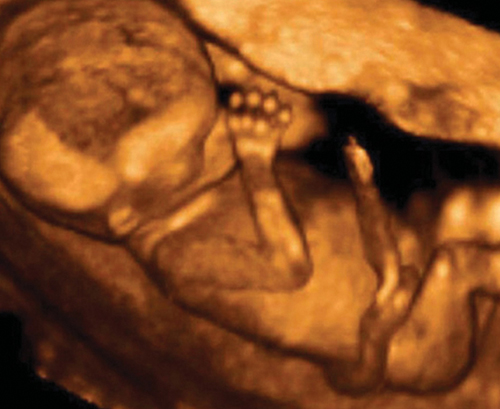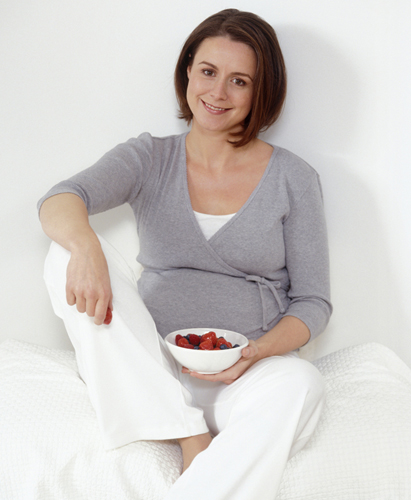You are 14 Weeks and 4 Days 178 days to go…
To function successfully, the placenta needs a good maternal blood supply to the arteries in the wall of the uterus.
The placenta now starts a second wave of growth
that will take almost six weeks. The outer layer of cells in the
placenta move into the coiled, or spiral, arteries in the uterus,
destroying their muscular wall. This causes the arteries to dilate,
resulting in a low resistance to blood flow. Only those arteries beneath
the placenta (80–100 vessels) are invaded by the placental cells in
this way. If these cells move too deeply, they can fuse too tightly with
the muscle of the uterus and have difficulty separating after delivery.
If the wave of invading cells is inadequate, however, the low
resistance to blood flow doesn’t develop. This can increase the risk of
the mother developing preeclampsia, and cause the baby growth problems.
… Doctor
| Q: |
I’m trying to stay out of the sun but is it okay to use fake tanning lotions?
|
| A: |
Sunless tanning lotions are safer than sunbathing or tanning
beds but they have not been tested on pregnant women so their effects
aren’t known. It may be better to err on the side of caution and go
without a tan while you’re pregnant. Bear in mind that a fake tan does
not protect your skin so, if you do wear it, you’ll need to wear
additional protection when you are in the sun.
No tanning pills of
any kind have been approved by the Food and Drug Administration. They
may contain canthaxanthin and can be toxic to your unborn baby, and also
have been known to cause hepatitis and eye damage.
|
Sleep remedies
Even though you may not need to go to the bathroom
as much at night as you did in the first trimester, and may not yet be
suffering from too many aches and pains, sleep may still escape you in
the second trimester.
You may find that
during this life-changing time you may be having especially vivid
dreams, which can disrupt your sleep. Even if you’re feeling well, it’s
essential to get adequate sleep: after all, your body is working hard to
create another life. To get more sleep:
Eat a late-night snack containing the amino acid tryptophan , which is sleep inducing.
Don’t watch TV in bed for an easier time falling asleep.
Cut down on caffeine and make non-herbal fruit tea your bedtime drink instead.
Take a bath before bedtime, with soft music or candlelight (see below). Make sure the water isn’t hot since because this can stimulate rather than relax.

It is a native Hawaiian belief that the placenta is part of the child.
It is a tradition to plant the placenta with a tree, which then grows alongside the child.
You are 14 Weeks and 5 Days 177 days to go…
You might receive some compliments, because at this stage of pregnancy you’re likely to look glowing with good health.
Your baby today
This 3D ultrasound shows the hands held up in front of the face.
The knees seem “knobby” with every bone clearly seen on the scan. The
soft spot on the baby’s head can also be seen: this protects the brain
while still allowing for its rapid growth.

In the second trimester,
the combination of thick, luscious hair, rosy cheeks, and fewer
pregnancy discomforts may make you look as though you’re glowing.

The terms “blooming” or “glowing”
are often used to describe pregnant women, especially during the second
trimester. The ideal image is a woman with thick shiny hair and perfect
skin that has a healthy blush.
The improved condition
of your skin is thanks to the hormone estrogen (pregnancy hormones can
have positive effects, too!) and the increased blood supply to the skin;
the many blood vessels just below the skin’s surface give you a healthy
glow, or at least stop you from looking pale and tired. The glands also
secrete more oil, giving your skin a healthy-looking sheen.
Again due to hormonal
changes, your hair may look thicker. Less hair than normal falls out
during pregnancy and hair grows more quickly. After the birth you may
find that your hair appears to be falling out more than normal as you
lose the hair that’s built up during the nine months. Normal hair loss
is about 100–125 hairs a day; after the birth you might lose 500 hairs a
day.
If you don’t feel you
match this picture of good health, it may just be that you can’t see it
yourself, especially if you’re still adapting to your pregnancy. If
you’re looking pale and feeling tired, speak to your doctor because you
may be anemic and need to boost your iron intake (see Iron-rich foods).